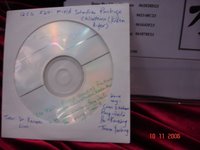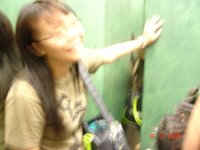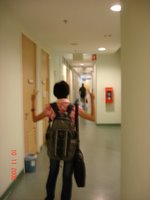Does Geography have any 'big ideas/concepts' other than space'?
Funnily enough, I did a search in the Internet with Webcrawler and I found a pdf. article that talks about 'enduring understandings' by Wiggins and McTighe. According to these two authors, 'enduring understandings' refer to important ideas and values that will last beyond the classroom. Interestingly, the article mentioned that the 'enduring understanding' in Geography deals with the issue of 'where we live influences how we live'. Why do I say interesting? Obviously when the article talks about 'where', it refers to places and spaces. Geography is viewed as a spatial subject where spaces are seen as 'abstract' containers which are filled with human, cultural, socio-political, natural landscapes.
On the other hand, it is of particular interest that the article has a section on Social Studies (how apt, since we will be taking SS next semester) which states that SS has an 'enduring understanding' of how
People really do see the world in fundamentally different ways. People behave as they do because of the things they believe in and value. People behave as they do for a reason.This brings to my mind an interesting argument that we had in my Honours year during Geography Thought about what Geography is all about. And we had the benefit of having a debate with the Sociology Department about whether Geography or Sociology is important or not. It seems to me that what this article implies that Geography is inherently a spatial subject devoid of humanistic touch, while this is vice versa for SS. There appears a perpetual tension over whether Geography is the 'mother' of all subjects since it encompasses concepts from all disciplines from the sciences to social sciences and humanities or if Geography as a subject is redundant.
Culture is dynamic and powerful. It shapes how we view the world, ourselves, and others.
I think it is pertinent to consider such theoretical stands as we embark on our teaching career. The Geography syllabus has changed much since our times. What students are learning are far broader and deeper than what we did during our Secondary school days. The concepts of 'industrialisation' in the context of uneven development and 'gloabalisation' have taken prominent place in the Geography syllabus. Yet, such concepts do not appear only in the Geography textbooks. In Social Studies, students are taught the topic of industrialisation in Singapore. Social Studies seem to be more dynamic and vibrant as it even talks about the topic of geopolitics in Singapore-Malaysia ties, the Sri Lanka conflict etc. What I am arguing over here is that the lines can be so blur between Geography and SS that sometimes Geography teachers can have a mini, if not major, identity crisis.
If teachers can have such identity crises, what more can students face? Being amateurs in the academic world, they study such concepts in Geography and Social Studies. How can they not be confused by what Geography is all about? Being amateurs, they cannot be taught the most fundamental concepts of 'space' and 'place' (give and take, 'time' as well). These concepts are too abstract for their understanding. Even academics in the tertiary institutions are embroiled in this never-ending argument about space and place and Geography. If this is so, how can teachers confidently 'define' their subject to their wards? How to then teach Geography to students when they study concepts that are not exclusive to the subject alone? It is possible to say that one is a Chemistry, Biology, Physics and even History teacher in schools because their definitions are very basic and clear to students. What makes a Geography teacher? What makes Geography? Can we just give them the simple definition of "Geo=earth, graphy= study of" and so Geography is the study of the earth? When students think of Earth, is it an Earth which has only natural landscapes on it, or one that is seen from the outer space, or one that encompasses both human and natural elements in it? Can Geography be defined only with concepts like 'globalisation' etc., concepts which seem so far away from our students?
How can one demarcate the boundary between the 2 disciplines of Geography and Social Studies, for the matter? In reality, 'globalisation' does not belong to Geography alone. Other concepts like 'Regionalisation' cannot be claimed by Geography alone. These concepts are readily bandied about in other disciplines as well. In the case of 'regionalisation' and 'uneven development' etc., they can be key concepts in Economics as well. Even the late Edward Said's 'geographical imagination' does not have 'geographical' roots as he was not a Geographer. So what makes Geography? Space? The study of maps alone? Geography has to stay relevant in contemporary times. It cannot just be the subject which studies only maps. The above mentioned concepts belong almost exclusively to in the Economic sphere, which seem to suit to Singapore's pragmatic needs. Hence, perhaps this may shed light on why our Geography syllabus has changed so much since our times. The question, however, is Geography in our syllabus 'holistic' enough to make our students realise that it goes beyond 'regionalisation', 'uneven development' and 'globalisation'?
Also how does one tell a student that he/she studies Geography and hence he/she can explain some 'geographical' phenomena to the layman when 1) sub-discipline specialists like geologists, hydrologists, transport specialists (notice even ST do not call Profs. Paul Barter and Ragu geographers), ecologists are often interviewed in newspapers and not geographers when events of geographical importance had occured and 2) Social Studies serve only to confuse them even more?













